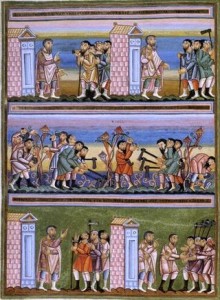Thoughts on Today’s Lessons for Sept. 21, 2014
First Reading: Exodus 16:2-15God has brought Israel out of Egypt with a mighty hand, protected the children in the first Passover, and led Moses and the people through the Red Sea as they move on toward the Promised Land … and now they complain about the food! “Why didn’t God just kill us in Egypt,” they whine. “That would have been better than starving!” But the message is clear: Even when God’s people grumble and whine, even when we stumble and fall, God loves us all the same, and God provides.
First Reading (Track 2): Jonah 3:10-4:11
Last week we heard Matthew’s Gospel about the parable of the king who forgave a slave’s debt – until that slave declined to forgive his debtor in turn. Now we look back to the First Testament for another insight to God’s desire to forgive: Jonah, having resisted God’s call to go prophesy to Israel’s ancient enemies in Nineveh, the capital of Assyria, is now angry because God declined to destroy Nineveh after its people repented. But God stands firm, preferring mercy and forgiveness to revenge.
Psalm: Psalm 105:1-6, 37-45
The Psalmist looks back and remembers the joys and trials of Israel in the desert, and places it in the context of God’s covenant with the people at Mount Sinai: God will give the people land and wealth. The people shall respond by following God’s teaching and God’s laws, calling them to be righteous and just. Praise the Lord indeed!
Psalm (Track 2): Psalm 145:1-8
Like a great symphony that ends with a mighty coda, the book of Psalms comes to a triumphant close with joyous hymns of praise for God’s great glory. Psalm 145, which serves as a transition to that finale, reinforces the message that we heard in Jonah as the Psalmist exults in God’s righteousness, grace, generous mercy and steadfast love.
Second Reading: Philippians 1:21-30
We now turn to Paul’s letter to the people of Philippi in Macedonia, Northern Greece, a Gentile community largely populated by the descendants of Roman soldiers. It was Paul’s first church in Europe, and his affection is apparent throughout the short letter. He is thought to have written this letter from prison in Rome, where his execution was a real possibility; and this may have inspired his reflections on life and death. If he lives, he says, he will take joy in continuing to spread the Gospel; but he is just as willing to die, for he understands death as being with Christ forever.
Gospel: Matthew 20:1-16
Like so many of Jesus’ parables, this Gospel forces us to stop and think. If we read it with a modern understanding of fairness, we probably side with the workers who toiled all day. Why should those who came late and worked for only an hour be paid the same as those who worked hard all day? Unfair! But God’s ways, as reflected in the parable, are not our ways: We all earn God’s grace in equal measure, whether we were cradle church-goers or just arrived last week. God’s gifts to others in no way take away from God’s gifts to us; and God’s generosity should give us cause for celebration, not jealous grumbling.

